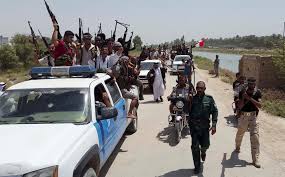January 2016
If
we take a look at Iraq’s provinces bordering Iran we come to realize that
Diyala is the only province where Sunnis are in majority, of course not
considering the Kurds in the north. Therefore, Iran considers its borders with
this province as unsafe and senior regime officials and Quds Force commanders have for years been dreaming of
implementing plans of religious cleansing in Diyala. From 2003 to this
day this province has always been the target of ethnic cleansing.
Currently
the security situation in
Diyala Province is described as very dangerous and concerning. Iran has
been staging new crimes aimed at ridding the entire area of its Sunni
population.
Baquba, the provincial capital of Diyala, has
become a powder keg that may explode at any moment, especially considering
the influence enjoyed by armed Shiite militia groups and the presence of
hundreds of Iran’s Revolutionary Guards members.
Conditions
will most likely intensify, according to assessments of political and tribal
figures in this province, citing the fact that Shiite militias are seeking such
crises in Diyala, and foreign
parties – specifically Iran – will profit from such conditions in this Iraq
province in which Sunnis are at a majority. The residents of various
parts of this province are mostly Shiite, providing grounds for the Shiite “Popular
Mobilization Forces”. As a result, Diyala is considered one of the most important areas of Iraq, militarily,
strategically and politically.
Iran has a plan to transform Diyala into a strong
and important line of defense for the sake of its national security interests. This is not only related
to terrorism and ISIS. In fact, such an issue is fundamental to Iran’s very
existence since Tehran doesn’t
want any area adjacent to its borders to have a majority Arab Sunni population.
Iran is fueling sectarian vengeance attacks in
Diyala,
knowing it will profit considerably if it escalates the status quo to
conditions worse than any sectarian war: a civil war between Diyala’s Sunni and
Shiite locals. If such a sectarian conflict erupts in Diyala and destroys all
coexistence between the fighting sides, Iran can direct the armed Shiite groups to launch
widespread cleansing operations and expel the Arab Sunnis from this
province to facilitate the transformation of this area into a Shiite region.
Iranians believe a religious cleansing campaign in Diyala Province – with a 240
kilometers in ground borders with Iran – will increase its overall border
security with Iraq.
Iran resorts to a pretext claiming ISIS will once
again return to Diyala if Shiite militia groups are forced out of the province and
control is placed into the hands of the Iraqi army and police. Shiite militia
groups are using this pretext to remain in Diyala and taking advantage of
Iran’s influence as an excuse to carry out sectarian cleansing.
Following
the recent crimes committed by Shiite militias in the town of Meqdadiya of
Diyala Province, one may imagine Iran’s influence may be degrading in Diyala
Province, and even claim Iran has retreated from such intentions. Facts on the
ground say the exact opposite as the influence of Iran and the Shiite militias is on the rise, meaning
they are simply waiting for specific parameters to launch their sectarian
cleansing.
Some
may think defeating ISIS in al-Anbar, Kirkuk or Mosul in the far north regions
of Iraq and areas in Salahadin Province can challenge Iran’s plans for Diyala
Province. Iran’s scheme for
Diyala and turning this region into a defensive line will begin after
destroying ISIS. In the
next phase after ISIS, Iran will issue a license to kill and widespread
political and geographical cleansing. Various factions, especially in
the Popular Mobilization Forces, believe the situation in Diyala and other
areas must be re-organized after defeating ISIS, and that these areas cannot be
simply abandoned.
Different armed Shiite militia groups have
established large military bases in Diyala and along the Iraq-Iraq border, in which Iranian military personnel are
training PMF members on how to protect the joint borders. Furthermore, various Shiite groups have replaced
Iraqi army forces in various sites, inside Diyala or Baquba, or the so-called
border points.
The
influence and hegemony of the Iraqi army and Defense Ministry in Diyala is less
significant in comparison to other areas in Iraq, thanks to the efforts of armed
Shiite groups in Salahadin neighboring Diyala. The Iran is attempting to have the Shiite militias control
military-security initiative, not the Iraqi military armed forces. This
is vital for Iran’s plan in turning Diyala into a strategic line of defense
protecting its national interests in the future.

No comments:
Post a Comment